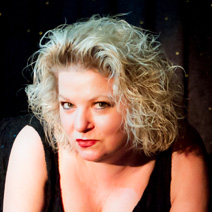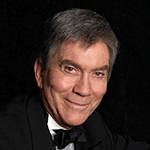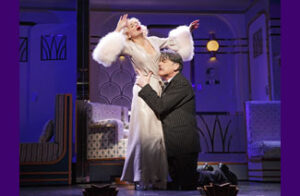Tanya Moberly
Songs I Feel Like Singing
Don’t Tell Mama, NYC, November 13, 2015
Reviewed by Rob Lester for Cabaret Scenes
 Her lips purse. Hands are on her hips. Eyebrows rise in a “why-am-I-not-surprised?” reaction, then the unblinking eyes roll with the frustration of that “Come on: Really?!?” impatience. She clenches her jaw, then grits her teeth. She could eat you alive, if she weren’t so busy singing. Gestures suggest coiled tension. She seems ready to pounce. And that’s all in the first song. It’s “I Want You to Want Me” (“I want you to want me/I need you to need me/I’d love you to love me/I’m beggin’ you to beg me…”). This opening selection in the eclectic set list is via the rock group Cheap Trick, but the Moberly modus operandi has no cheap tricks: she digs into the material, creates detail-rich characters and commits to them. While the cabaret chanteuse more typical traipses through the tuneful treasures of Porter, Arlen or Rodgers, Miss Moberly mines her own generation’s pop/rock and singer-songwriter catalogues. For example, a past show surveyed Ani Di Franco, and three of her songs are presented in this particular act. While the pop/rock on the bill isn’t in the mold of the Great American Songbook’s love ballads or their most obvious successors, the choices are also far from bubble gum or mindless rants. In fact, language and images are colorful — which one must admit, even if those colors aren’t your favorite hues.
Her lips purse. Hands are on her hips. Eyebrows rise in a “why-am-I-not-surprised?” reaction, then the unblinking eyes roll with the frustration of that “Come on: Really?!?” impatience. She clenches her jaw, then grits her teeth. She could eat you alive, if she weren’t so busy singing. Gestures suggest coiled tension. She seems ready to pounce. And that’s all in the first song. It’s “I Want You to Want Me” (“I want you to want me/I need you to need me/I’d love you to love me/I’m beggin’ you to beg me…”). This opening selection in the eclectic set list is via the rock group Cheap Trick, but the Moberly modus operandi has no cheap tricks: she digs into the material, creates detail-rich characters and commits to them. While the cabaret chanteuse more typical traipses through the tuneful treasures of Porter, Arlen or Rodgers, Miss Moberly mines her own generation’s pop/rock and singer-songwriter catalogues. For example, a past show surveyed Ani Di Franco, and three of her songs are presented in this particular act. While the pop/rock on the bill isn’t in the mold of the Great American Songbook’s love ballads or their most obvious successors, the choices are also far from bubble gum or mindless rants. In fact, language and images are colorful — which one must admit, even if those colors aren’t your favorite hues.
Tanya Moberly is a force to be reckoned with and your day of reckoning would come if you were the subject her adopted characters were singing to—or about. It’s likely you’ll find a feeling, fury, or flip remark that rings a bell somewhere along the way.
But don’t expect to sit back and relax with musical comfort food. This can be visceral.
This performer is somewhat allergic to patter. Sometimes, she’ll have virtually none. I don’t know what the show next week will bring as far as patter, though the musical selections won’t be the same. In the show viewed, there was, however, a friendly and down-to-earth spoken introduction, which includes the info that she’s been doing four different sets of Songs I Feel Like Singing, each with a different solo musician as accompanist, this year. November 13’s event had bassist supreme Ritt Henn on hand. Not many singers of any genre would dare to do an entire show with just a bass player. Jazz icon Sheila Jordan comes to mind, but the resemblance ends there. Knowing her chosen collaborators’ work and styles, she explains that she tailors the set list to showcase their strengths. And such was often proved in the pudding, as the saying goes. But it’s a shame— a missed opportunity, in my view—that versatile Miss M. didn’t take on one of the many fine/quirky original numbers from the pen of Henn. Perhaps she felt she couldn’t do them justice, feeling somewhat intimidated by his indelibly masterful own recordings of them on his albums and didn’t want to try. But it’s tough to imagine this formidable figure being intimidated by much of anything.
The affable and adept Mr. Henn seemingly plays music with his whole body and soul, including the funnybone. His considerable enthusiasm and joy are matched by his artistry as he jumps from one mood to the next number’s commanding or mysterious intro (or tunes up, necessarily, then plunges in alongside his equally game gal musical partner). He can dominate with drive and fire or pull back when a key moment in a song demands undivided attention towards the singer/actress. A natural laugh may come from him when things get wild and woolly or it can be caused by the pure pleasure he is apparently taking in his responsibilities. Whereas some instrumentalists—sidemen or pianists who are many singers’ only other on-stage presence—can look like they’re simply doing their job without relishing it, Henn radiates happily involved partnering participation in nearly every situation. Switching from acoustic bass to electric, plucking or bowing the former, he’s both entertaining and emotional, carrying more of his share of the “burden” (I suspect he’d never use that word for most gigs). And he has a way of making even the sentimental or searing sound cool. (His deep-seated musicianship used to regularly improve even the corny material and very limited singers at a long-running open mic called MetroJam, doing the musical magic trick of making lemonade from lemons.)
Moberly would never have survived in the tighter box that defined girl singers in the 1950s, when record companies wanted pretty sounds, and lulling ladylike legato sounds were the order of the (Doris) Day, and one might have been led to taking a page from Patti Page or Julie London’s sultry sotte voce pseudo-seductions. Although often relying on a nasal whinny to pierce the air with pinpoint precision so that a lyricist’s most unusual or cutting word choices stood out, phrases clothed in more velvet were welcome relief and could be just as effective. Compared to past shows she had less reliance on mega-volume; some crooned and purer notes made this listener long for more exploration of that side of her voice for longer periods.
When the situations demands it, she can be damn demanding: Listen: “I need a wet kiss, I need to confess/I need a vision, religion, the right to be silent/And then to be heard/A week on an island, a diet that works…” (Meredith Brooks/Shelly Peiken, “I Need”). But her performance’s glares and stares and desperation and desolation also suggest that some needs just won’t be met. And maybe the lover who’d satisfy some of those needs hasn’t been met either. As is her wont, she doesn’t set up her songs with patter; she just sets up her character, specific energy and stance set from each number’s start, before a word passes through her lips.
A nice change of pace, which would have been more impactful if not placed so early, was “Dat Dere,” Oscar Brown Jr.’s portrait of a little kid with a whole lot of questions (and the accompanying parent). Unlike in Brown’s own version, the “quizzical kid” is a girl. It’s fun to see Tanya as a tot, but guess what: because of the song, she’s still being demanding.
Maybe this is the wide-eyed, greedy toddler who grows up to be the person singing “I Need”?
And just when you might think her fits of frustration, fierceness, frenzy and frazzled nerves vented through more contemporary pop/folk songs will strike again and that she’ll strike another pose (or strike you), she surprises with vulnerability. Stripped of strengths seen before, the mask falls with an unheard thud and she’s atop the piano, wistfully confessing her dismay at having a case of unrequited love with that lament “I Can’t Started” introduced by Eve Arden and Bob Hope about 80 years ago in The Ziegfeld Follies. Some update the topical lyrics, but Moberly instead just made one change: at the end, with a respectful nod to the lyricist by substituting his own name, crooning that she’d had an invite from that couple about town, “the Ira Gershwins.” Moberly being Moberly, there was bemusement and a touch of being maddeningly puzzled as well as despondently carrying the torch. And for her post-cheers encore, she chose to leave us with more sadness and despair with the classic “Lush Life” by Billy Strayhorn, as if to suggest that some of preceding struts of a contentedly strong, independent woman and parade of gripes and demands in relationships where she seemed to have the upper hand may melt away. Bravado and the comfort of brandy only last so long, despairing nights last forever, and there she is—in “some small dive,” fully expecting to be ensconced, “where I’ll sit and rot with the rest of those whose lives are lonely, too.”
This cabaret/pop vignette presenter owned the stage and owned each composition and character. With experience from different points of (audience-oriented) view, she’s also a director for others and the producer of the Sunday night themed open mic The Salon at the West 44th Street restaurant Etc. Etc., two blocks south of Don’t Tell Mama where she’s been booked regularly since just before the turn of the century.
This Friday, November 20, at the same venue, Tanya Moberly will team with popular cabaret/pop pianist Steven Ray Watkins. Expect more fireworks.





